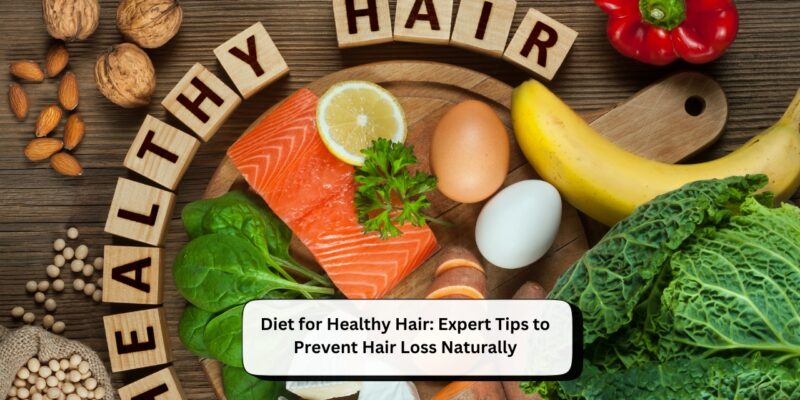Diet for Healthy Hair: Expert Tips to Prevent Hair Loss Naturally
If you’re dealing with hair loss and want a natural, effective solution, the secret might be sitting right in your kitchen! Yes, the diet for healthy hair is not just a buzzword, but a crucial aspect of maintaining thick, strong, and shiny hair. What we eat directly affects the strength of our hair, its growth rate, and even its texture.
Many of us focus on expensive hair treatments or salon visits, but often overlook one simple yet powerful solution—food! A balanced hair growth diet plan rich in vitamins and nutrients can help reduce hair fall and enhance growth.
In this blog, we’ll dive into expert tips on how to prevent hair loss naturally using the right foods and vitamins, and how to structure your diet for hair growth. Ready for luscious, healthy locks? Let’s get started!
Why Diet Matters for Healthy Hair
Before we jump into the specifics of a hair growth diet plan, let’s understand why diet plays such an important role in hair health. Hair is made up of proteins, and like any other part of your body, it requires nutrients to grow and remain strong. Poor nutrition can lead to hair thinning, loss, or even stunted growth. If your body lacks the essential vitamins and minerals, your hair may not receive the nutrients it needs to thrive.
Key Vitamins and Nutrients for Hair Growth
1. Vitamins for Hair Growth: A Must-Have
Vitamins are essential for hair growth, and each one plays a specific role. Let’s talk about the most important ones:
-
Vitamin A: This vitamin is crucial for cell growth, including hair cells. It helps in producing sebum, the natural oil produced by the scalp that keeps your hair moisturized and healthy. You can find vitamin A in foods like sweet potatoes, carrots, and spinach.
-
Vitamin E: Known for its antioxidant properties, vitamin E helps improve scalp circulation, which in turn boosts hair growth. Nuts, seeds, and avocados are rich in this vitamin.
-
Vitamin C: It’s essential for collagen production and protects hair follicles from damage caused by free radicals. Citrus fruits like oranges and strawberries are a great source of Vitamin C.
-
Biotin (Vitamin B7): Biotin is a superstar when it comes to promoting hair health. It strengthens hair strands, prevents hair thinning, and supports healthy growth. Biotin-rich foods include eggs, almonds, and avocados.
2. Iron and Zinc: The Mineral Heroes
Iron and zinc are two key minerals for hair growth. Iron helps red blood cells carry oxygen to your hair follicles, promoting hair growth. Lack of iron can lead to hair thinning or hair loss, especially in women. Foods rich in iron include leafy greens, lentils, and red meat.
Zinc, on the other hand, helps in tissue growth and repair, both of which are vital for hair health. It also helps maintain oil glands around your hair follicles. Add more zinc to your diet by eating pumpkin seeds, chickpeas, and cashews.
3. Omega-3 Fatty Acids for Stronger Hair
Did you know that healthy fats are just as important as proteins for your hair? Omega-3 fatty acids keep your scalp healthy and hydrated, creating an ideal environment for hair growth. Include foods like flaxseeds, walnuts, and fatty fish (salmon, mackerel) in your diet for luscious hair.
4. Protein: The Building Block of Hair
Since hair is made up of protein, getting enough protein in your diet is essential for hair strength and growth. Protein-rich foods like chicken, tofu, quinoa, and beans support hair follicle health and promote healthy growth.
Foods to Include in Your Diet for Healthy Hair
1. Eggs: The Powerhouse of Hair Nutrients
Eggs are a rich source of protein, biotin, and other vitamins that support hair growth. They help in strengthening hair follicles and encourage the regeneration of new hair cells. Add eggs to your diet in a variety of ways—boiled, scrambled, or in omelettes.
🔗 Learn more about Protein and Hair Growth
2. Spinach: A Green Goodness for Hair Growth
Spinach is packed with iron, folate, and vitamin C—all essential for maintaining healthy hair. These nutrients help prevent hair loss, stimulate growth, and support a healthy scalp. Incorporate spinach into your diet through salads or smoothies.
3. Sweet Potatoes: Vitamin A in a Tasty Package
Sweet potatoes are an excellent source of beta-carotene, which the body converts into vitamin A. This helps maintain a healthy scalp and supports sebum production, preventing dryness and dandruff. Bake them or toss them into a curry for a delicious addition to your diet.
4. Berries: Packed with Antioxidants
Berries are rich in vitamin C and antioxidants, both of which fight hair damage caused by free radicals. Eating berries regularly promotes collagen production and strengthens hair follicles. Enjoy them as a snack, or add them to smoothies and breakfast bowls.
5. Nuts and Seeds: Your Hair’s Best Friend
Nuts and seeds (especially walnuts, flaxseeds, and chia seeds) are rich in omega-3 fatty acids, zinc, and protein. These nutrients nourish the scalp and promote hair strength. They also help in reducing hair thinning.
Avoid These Hair Damage Culprits
While focusing on the right diet for hair growth, it’s also important to avoid certain foods and habits that can harm your hair health. Try to limit:
-
Excessive Sugar: Too much sugar can spike insulin levels, causing hair follicles to shrink and weakening hair strands.
-
Processed Foods: These foods often lack essential nutrients and can negatively impact hair quality over time.
Hair Loss Prevention with Natural Foods
If you’re looking to prevent hair loss naturally, it’s important to balance your diet for healthy hair with other lifestyle practices. Here are a few tips to pair with your healthy eating habits:
-
Drink plenty of water to keep your hair hydrated.
-
Use gentle, sulfate-free shampoos to avoid stripping your hair of natural oils.
-
Protect your hair from direct sunlight, heat, and harsh weather.
Professional Help for Hair Loss Prevention
While a healthy diet is a key component, sometimes professional help is necessary to address severe hair loss. Clinics like iGraft offer advanced treatments such as PRP therapy and FUE hair transplants for individuals seeking a more long-term solution to hair thinning and baldness.
Conclusion
Maintaining a diet for healthy hair isn’t about quick fixes—it’s about long-term nourishment. By incorporating the right vitamins, minerals, and proteins, you can prevent hair loss and promote strong, shiny hair. Remember, a balanced diet is not only essential for your hair but also for your overall health.
Start with small changes, and over time, you’ll see the difference in your hair’s texture, volume, and strength.
For expert advice on hair restoration, visit iGraft, where trusted professionals guide you towards the best hair care solutions.










